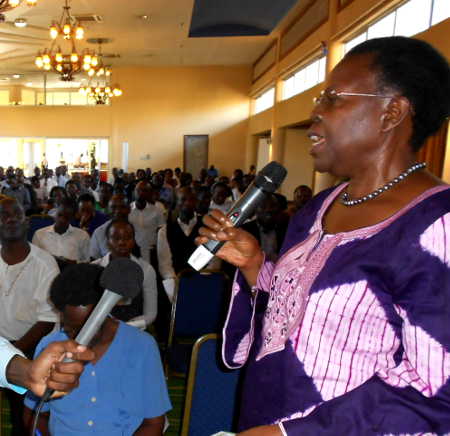Analysis
Is UAA Uganda’s answer to Under-development?

UAA founder Victoria Ssekitoleko speaking at a recent event in Kampala
Edward Katende, one of the founders of UAA says the initiative seeks to remove the spell cursed around the agricultural sector that has kept millions of Ugandans in poverty despite the obvious fortune brought about by nature.
Speaking to this reporter at the recent Generation Agripreneur Summit and Expo held at UMA show grounds in Lugogo, Katende noted that the initiative was born out of the desire to create a platform that brings together various stakeholders with the view to developing successful businesses built around the farmer.
“UAA is an action platform that brings together different stakeholders such as agricultural input dealers, financial institutions that lend to farmers, government and donors that finance the sector, on a round table to remove barriers to building successful farming businesses, ” Katende adds.
“Each of them should make a commitment to solving an identified problem. Then we take them on their commitment. We ask them to make a report after which we make an independent assessment on their report.”
UAA is not here to duplicate efforts. Rather, we want to ensure that people are not duplicating initiatives. We intend to bring together input dealers so that we can have a unified voice. If it is an issue to do with inputs, we want to bring together USTA which is the umbrella body for seed traders, UNADA – which is the body for chemicals importers and others in the field so that we can have unified voice.”
We are not here to beat up government, but instead to coordinate government efforts. If government is working on an initiative like Operation Wealth Creation (OWC), we are saying agricultural extension services is a challenge to Uganda, we want to bring together the various players including the government, donors and the private sector to develop a holistic approach on extension services provision. So that it stops being a matter for NAADS or Soldiers alone.”
“We are saying, can we coordinate and strengthen all efforts by different players in Agriculture, looking at key issues that are hindering growth in the sector,”
Katende argues that the best approach to poverty eradication is by looking at farming as a business.
Katende argues: “If the farmer is not assisted, banks will not make money because they will not have anyone to lend to or even save. Processors will have no raw materials.”
While majority of Ugandans depend on agriculture as a source of livelihood, majority remain subsistence farmers growing food crops on increasingly smaller plots.
Several initiatives by the NRM government have failed to lift farmers out of poverty nor transform farming into a successful business.
A new World Bank report: “Growing Africa: Unlocking the Potential of Agribusiness,” says that Africa’s farmers and agribusinesses could create a trillion-dollar food market by 2030 if they can expand their access to more capital, electricity, better technology and irrigated land to grow high-value nutritious foods.
Katende argues that with the enormous potential in Uganda’s agriculture, better coordination can enable Uganda to aim at 5% of the one trillion dollars (US$50bn) which would double the country’s current total GDP.
“There is a lot of money out there meant for farming. When investors come into the country, they say they cannot find anywhere to put their money, simply because Uganda acutely lacks well-run agricultural businesses. Those that are there such as Biyinzika, Ugachick and a few others already have a number of foreign investors knocking on their doors.”
He adds: “We want to put business first in all efforts to modernize agriculture.”
UAA’s ideas seem to be attracting support from the government and donors, if the initial partnerships are anything to go by.
According to Katende, UAA has so far concluded a contract to review a multi-billion shilling Agricultural Credit Facility (ACF) managed by the Bank of Uganda.
UAA has also created a platform to create greater access to finance for farmers, an arrangement that has received kind financial support from the Dutch government funding agency SNV and the German development agency GIZ.
President Yoweri Museveni has been promoting value addition. However, according to Katende, the government policies and funding are not coordinated to created an environment that truly supports value addition.
“The government is promoting value addition, while at the same time imposing heavy taxes on materials used for packaging.
“We are saying; can the government soften taxes on packaging materials or find an alternative way to recoup the lost tax revenue by for example shifting it on packed juice?”
UAA’s plan appears attractive and backed by experienced and passionate individuals. However, promoters of this high-sounding plan will contend with Uganda’s greatest challenge – translating plans into actions – Uganda’s greatest challenge.
Comments


















